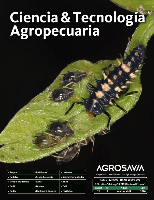
Revista Corpoica-Ciencia y Tecnologia Agropecuaria
Scope & Guideline
Transforming Agricultural Practices through Cutting-Edge Research.
Introduction
Aims and Scopes
- Agroecological Research:
This includes studies on agroforestry systems, sustainable agricultural practices, and the impact of agricultural management on ecosystems. The journal emphasizes the importance of integrating ecological principles into agricultural practices to enhance productivity and sustainability. - Crop and Livestock Improvement:
Research on the genetic, nutritional, and health aspects of crops and livestock is a core focus. This involves the evaluation of different varieties, breeds, and feeding strategies to optimize production and resilience against environmental stresses. - Soil and Fertilization Studies:
The journal covers research related to soil health, nutrient management, and the use of organic and inorganic fertilizers. Studies often focus on improving soil fertility and understanding the interactions between soil organisms and plant health. - Pest and Disease Management:
Research on the biology and control of agricultural pests and diseases is a significant area of focus. This includes studies on integrated pest management (IPM) strategies and the effects of biocontrol agents. - Postharvest Technology:
The journal addresses postharvest processes including storage, processing, and value addition of agricultural products. This area emphasizes improving quality and reducing losses in the supply chain. - Socioeconomic Aspects of Agriculture:
Research on the socioeconomic dynamics affecting agriculture, including farmer perceptions, market access, and the impacts of agricultural policies. This helps to understand the broader context in which agricultural practices operate.
Trending and Emerging
- Sustainable Agricultural Practices:
There is a rising trend in research focused on sustainable agriculture, including studies on agroecology, organic farming, and regenerative practices. This reflects a global shift towards more environmentally friendly and sustainable food production methods. - Biostimulants and Microbial Interactions:
Research on the use of biostimulants and beneficial microorganisms to enhance plant growth and resilience is gaining traction. This includes studies on microbial diversity in soils and their role in promoting crop health. - Climate Change Adaptation in Agriculture:
Emerging themes include the assessment of farmers' perceptions of climate change and its impact on agricultural practices. This trend signifies the importance of adapting agriculture to changing climate conditions. - Digital Agriculture and Precision Farming:
The use of technology in agriculture, such as high-throughput phenotyping and digital image analysis, is increasingly represented in publications, indicating a trend towards precision agriculture and data-driven decision-making. - Health and Nutritional Quality of Food Products:
Research focusing on the nutritional properties of agricultural products and the health benefits of various food sources is becoming more prevalent, highlighting the connection between agriculture and public health.
Declining or Waning
- Traditional Agricultural Practices:
There has been a noticeable decline in publications focusing on traditional farming methods, possibly due to the increasing emphasis on innovative and sustainable practices that leverage technology and scientific advancements. - Chemical Fertilizers and Pesticides:
Research centered on the use of chemical fertilizers and pesticides is becoming less prominent. This shift reflects a growing concern for environmental sustainability and a preference for organic and integrated approaches. - Livestock Production Systems without Technification:
Studies focusing on non-technified livestock management are decreasing, as there is a trend towards more technologically advanced systems that aim to improve efficiency and productivity. - Single Crop Systems:
Research on monoculture practices is declining as the journal promotes more sustainable and diversified agricultural systems that enhance ecosystem resilience.
Similar Journals

Revista Ciencia Agronomica
Advancing agricultural knowledge for a sustainable future.Revista Ciencia Agronomica is a leading open access journal published by the Universidade Federal do Ceará, Departamento de Geociências, dedicated to advancing the field of agricultural sciences. Established in 2008, the journal has emerged as a significant platform for the dissemination of original research and innovative advancements in areas including agronomy, horticulture, and soil science, with a dedicated convergence of years extending to 2025. With an impactful presence in academic circles—ranking in Q3 for Agronomy and Crop Science and Soil Science and Q2 for Horticulture in 2023—this journal provides vital insights for researchers and practitioners alike. Although specific HIndex metrics are currently unavailable, the journal's Scopus rankings attest to its relevance, placing it in the 52nd, 44th, and 43rd percentiles across multiple pertinent categories. Since transitioning to an open access model in 2010, Revista Ciencia Agronomica has committed to maximizing the reach and impact of its published work, thereby ensuring valuable contributions to global agricultural knowledge.

Romanian Agricultural Research
Elevating Agricultural Insights for Tomorrow's ChallengesRomanian Agricultural Research is a prominent academic journal dedicated to advancing the field of agricultural science with a specific focus on agronomy and crop management. Published by the NATL AGRICULTURAL RESEARCH & DEVELOPMENT INST in Romania, this journal has established itself as an important resource within its discipline, evidenced by its Q3 ranking in the Agronomy and Crop Science category for 2023. With its ongoing publication since 2008, the journal provides a platform for researchers and professionals to disseminate their findings and share innovative practices that address the challenges faced in agricultural development. Although it operates under a non-open access model, Romanian Agricultural Research commits to rigorous peer-review processes, ensuring the high-quality content that enhances the academic community’s knowledge base. The journal's objective is to foster dialogues surrounding sustainable agriculture, improve crop yield, and contribute to the enhancement of agricultural practices globally. Researchers, professionals, and students will find this journal to be an invaluable repository of knowledge and a catalyst for future agricultural innovations.
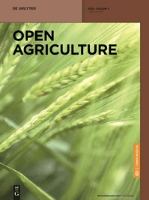
Open Agriculture
Nurturing Ideas for a Greener TomorrowOpen Agriculture, published by DE GRUYTER POLAND SP Z O O, is an innovative open-access journal dedicated to advancing research in the Agricultural and Biological Sciences. Since its inception in 2016, this journal has been committed to disseminating knowledge and facilitating collaboration among researchers, professionals, and enthusiasts in the agricultural sector. With an impressive Q2 ranking in the Agricultural and Biological Sciences category, it holds a prestigious position, ranking #65 out of 221 in its field, placing it in the 70th percentile. Open Agriculture offers a platform for high-quality research across a diverse range of topics, ensuring that crucial findings are readily accessible to the global scientific community. The journal continues to uphold its mission of promoting sustainable agricultural practices and innovations that address contemporary challenges in food security and environmental sustainability. With its strong commitment to open access principles, researchers and students alike can easily engage with cutting-edge research and contribute to the vibrant discourse surrounding modern agriculture.
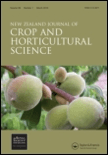
NEW ZEALAND JOURNAL OF CROP AND HORTICULTURAL SCIENCE
Pioneering Research for Tomorrow's Agricultural ChallengesThe New Zealand Journal of Crop and Horticultural Science, published by Taylor & Francis Ltd, stands as a key resource in the fields of Agronomy and Horticulture, with a commendable impact factor reflecting its quality and influence in the scientific community. Since its inception in 1989, this journal has been committed to advancing our understanding of crop development and horticultural practices, catering not only to researchers and professionals but also to students eager to delve into the intricacies of plant sciences. With a Q3 ranking in both Agronomy and Crop Science and Horticulture as of 2023, the journal occupies a significant position within the agricultural and biological sciences domain, significantly contributing to the body of knowledge in these fields. The journal features original research, reviews, and technical notes that cover a wide range of topics, ensuring a comprehensive perspective on contemporary and emerging agricultural issues. For individuals interested in accessing cutting-edge research, the journal provides subscription-based access, further enhancing its scholarly contributions.

Temas Agrarios
Exploring Solutions for Food Security and Rural DevelopmentTemas Agrarios is a premier scholarly journal focused on the dynamic field of agricultural sciences, published by the University of Córdoba, Faculty of Agricultural Sciences. Since its establishment, this journal has committed to advancing knowledge and fostering research in agricultural practices and policies, contributing significantly to the discourse surrounding food security, sustainable farming, and rural development. With an open access model implemented in 2003, Temas Agrarios ensures that critical information and research findings are readily available to the global academic community, promoting wider dissemination and accessibility. Researchers, professionals, and students can benefit from its insightful articles, which address pressing agricultural issues in Colombia and beyond, enhancing both local and international scientific dialogue. Although specific impact metrics such as H-index and Scopus rankings are not disclosed, the journal's longstanding presence underscores its importance as a platform for high-quality agricultural research.
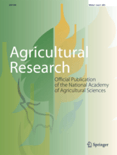
AGRICULTURAL RESEARCH
Exploring cutting-edge research to enhance food security.AGRICULTURAL RESEARCH is a distinguished academic journal published by SPRINGER INDIA, focusing on the dynamic fields of Agronomy, Crop Science, and Food Science. With an ISSN of 2249-720X and E-ISSN of 2249-7218, this journal has established itself as a valuable resource for researchers, professionals, and students dedicated to advancing agricultural knowledge and practices. The journal is recognized in the 2023 Scopus Rankings, achieving commendable quartile positions, including Q2 in Agronomy and Crop Science and Plant Science, as well as Q3 in Food Science, indicating its influential presence in the academic community. AGRICULTURAL RESEARCH aims to disseminate cutting-edge research findings, innovative methodologies, and comprehensive reviews, fostering collaboration and discussion among scholars in Switzerland and beyond. Through its commitment to scholarly excellence, this journal is pivotal in addressing contemporary challenges in agriculture, ensuring sustainability, and enhancing food security for the future.

Zemdirbyste-Agriculture
Fostering global discourse on food security and environmental health.Zemdirbyste-Agriculture is a prominent journal dedicated to advancing the field of agricultural sciences, with a particular focus on agronomy and crop science. Published by the Lithuanian Research Centre Agriculture & Forestry, this open access journal has been fostering knowledge sharing and scientific discourse since 2004, allowing researchers, professionals, and students unrestricted access to its content. Located in the beautiful country of Lithuania, specifically at Vytautas Magnus University, this journal plays a significant role in disseminating innovative research findings. With a 2023 Scopus ranking of #246 out of 406 in the category of Agricultural and Biological Sciences, Zemdirbyste-Agriculture falls within the Q3 quartile, reflecting its growing influence in the academic community. This journal, which has converged its publication focus from 2008 to 2023, aims to provide a platform for scientists to share their critical insights on agricultural practices, sustainability, and technological advancements in crop science, thereby contributing to the global discourse on food security and environmental health.
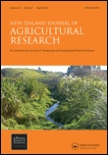
NEW ZEALAND JOURNAL OF AGRICULTURAL RESEARCH
Advancing Agricultural Science for a Sustainable FutureNEW ZEALAND JOURNAL OF AGRICULTURAL RESEARCH is a prestigious, peer-reviewed journal published by Taylor & Francis Ltd that has been at the forefront of agricultural science since its inception in 1958. With a strong focus on the fields of Agronomy and Crop Science, Animal Science and Zoology, Plant Science, and Soil Science, this journal has established itself in the academic community, achieving a notable Q2 ranking in various agricultural categories as of 2023. The journal thrives on its commitment to disseminating cutting-edge research and innovative practices that address contemporary challenges in agriculture. Although it does not currently offer an open access option, its valuable contributions can be accessed through various academic platforms, ensuring that vital research reaches a wide audience of researchers, professionals, and students globally. The journal's continued relevance and authority are reflected in its strong Scopus rankings, further emphasizing its role as a critical journal within the agricultural sciences.

Revista de Agricultura Neotropical
Transforming Challenges into Opportunities in AgricultureRevista de Agricultura Neotropical, published by UNIV ESTADUAL MATO GROSSO SUL, serves as a pivotal platform for disseminating research in the fields of agronomy and crop science. Since its inception as an open-access journal in 2014, it has been dedicated to promoting innovative research and practical applications within the agricultural sector, specifically tailored to the challenges and dynamics of the tropical agriculture landscape in Brazil and beyond. Although currently positioned in the Q4 quartile of Scopus rankings, and with a modest agricultural science percentile, the journal actively encourages contributions that highlight sustainable agricultural practices, tropical crop management, and emerging technologies in farming. With its commitment to open access, the Revista de Agricultura Neotropical broadens the reach of critical knowledge, making it accessible to researchers, professionals, and students alike, thus fostering a collaborative environment for advancing agri-scientific initiatives.

PHILIPPINE AGRICULTURAL SCIENTIST
Bridging Research and Practice in Agricultural Sciences.PHILIPPINE AGRICULTURAL SCIENTIST is a pioneering journal published by the University of the Philippines Los Baños, dedicated to advancing the fields of Agronomy, Crop Science, Animal Science, and Biotechnology. With an ISSN of 0031-7454, this esteemed journal provides a vital platform for researchers and practitioners focusing on agricultural innovations and practices in the Philippines and beyond. With a robust history dating back to 1996 and continuing through 2024, the journal operates within the Q4 quartile, reflecting its potential for growth and impactful contributions in its categories. Despite currently being positioned in the lower ranks, it serves as an essential publishing venue for nascent studies and localized research, contributing to the agricultural discourse. The journal fosters a collaborative research environment, encouraging submissions from both emerging scholars and seasoned experts, making it a valuable resource for students, professionals, and researchers engaged in the agricultural sciences. While it currently does not offer open access, it plays a crucial role in disseminating vital knowledge aimed at enhancing agricultural practices in the region.